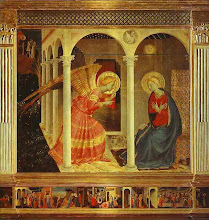While growing up, I was introduced to England, the land of my forebears, through the usual channels of literature and television. I committed to memory parts of the prologue to the Canterbury tales, read Shakespeare and watched Masterpiece Theater on Sunday nights.
It wasn't until I spent a year studying at Manchester College in Oxford, that I experienced for myself a bit of England in all its glorious richness.
Manchester College was (and still is I imagine) partly a training college for Unitarian pastors, partly a college for average British students, as well as a college for American students seeking a year of abroad study. Today it is affiliated with the University in Oxford, though when it was founded it was a separate institution for "dissenters". When I studied there I had the best of both worlds open to me, the lectures, the old Oxford architecture, the history apparent everywhere that told tales of past glories and sad division. And then there were the students at Manchester, many of whom represented the dissident past, the English Unitarians, a part of history about which I knew almost nothing. (It would have been even more fun had I known some Catholics in Oxford, those other dissident folk who were so famously martyred for their beliefs in England, but I don't recall meeting a single Catholic that year.)
I loved the Unitarians I met in England. They revealed to me the England I still carry around with me now in memory. I got to know them through my friend Penny, a woman who was studying to be a Unitarian minister.
On weekends Penny was assigned to various Unitarian parishes in the surrounding Cotswold villages where she would preach and lead worship services. She took me along with her to fill in as the accompanist at these churches. Ever ready for an adventure, I went out with her on several occasions in her small car that was always seemingly on the verge of breakdown. When we arrived at whatever village was hosting us for the morning or evening, we were invariably fed a bountiful tea, a pure delight to a young American. The vast array of baked goods was memorable.
Then followed the worship service. Penny and I would take a few minutes to survey the church, and I would examine the musical instrument available, usually a piano or a harmonium. I had never played a harmonium before, but I got the hang of it. The trick is to pump the pedals continuously so that air can flow through to the bellows and keep the sound going. Stop pumping and the tones will die away.
I don't remember any of the hymns we sang, or their texts, probably because playing an old harmonium in a damp church takes a good bit of concentration. But I do remember Mrs. Heywood.
Mrs. Heywood, one of the many obviously committed Unitarians present, older and without personal diffidence or timidity, invariably sat in the back of the church. This was quite possibly because of the style and size of her hats, which, had they been in front of others would have blocked their view entirely.
Mrs. Heywood had a large voice to match her tastes in hats, and she sang with complete confidence. She especially loved to hold onto high notes, so much so that I would be forced to pedal away furiously trying to sustain these long notes until Mrs. Heywood was ready to move on to the next musical phrase. There was no arguing with Mrs. Heywood, no moving the music forward unless she was ready to move also.
Afterwards, the ever-present sandwiches would re-appear, and tea would be on again. Mrs. Heywood would join in with the others, Penny would say a final prayer, and another Sunday would come to a close.
There was no pretense in these Sunday gatherings, no attempt at fashion other than Mrs. Heywood's hats, no intense conversation in the manner of serious undergraduates over their elevenses, nothing but friendly give and take among a fairly elderly group of people. I don't remember anything religious ever being discussed. It was civilized, warm and enormously comforting to a young student away from home for a year.
In the end, my year in England will remain in memory a year of self -discovery and study, to be sure, but it will also be the year during which I made the choice to spend part of my weekends volunteering in churches and hanging around with people like Penny and Mrs. Heywood, and many other kind souls. I made the decision to attend seminary myself only two or three years after that year. While I finally left Protestant ministry behind, I have never left the love for church in all its sorts and conditions. I don't know what were the beliefs of all those Unitarians I met, and it probably doesn't matter. They certainly didn't lead me astray in any way. As with many good church people, it was their kindness, their hospitality, their obvious love for their church that has remained with me.
It will not always be the Catholic Church that brings us into union with Christ, though it will be within the Catholic Church that the fullness of the faith is located. In my case it was several different churches that played a role before I found my home in Catholicism. I am thankful to Penny and Mrs. Heywood and the other English Unitarians who set me on my adult path toward serving the church. They will always be for me, as much as Shakespeare, Blake or Dorothy Sayers, my England!

No comments:
Post a Comment